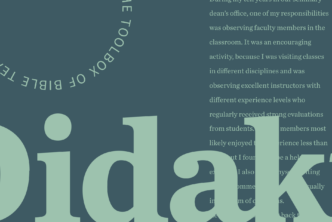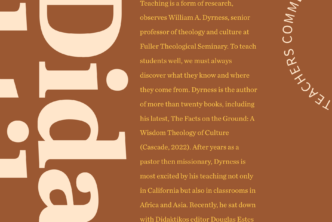Timothy Gatewood | Midwestern Baptist Theological Seminary
In a time when teaching success is defined by pragmatic, content-based assessment, I would like to offer a different path forward: teaching as ontological formation. Rather than viewing adjunct teaching as a means of content delivery, adjuncts should focus on the task of individual student formation. While this will require a shift in mindset for many of us, it does not need to be an either/or decision. Adjuncts have the responsibility to meet the common needs of all students and to develop them as theologians, historians, biblical scholars, and competent thinkers through the transmission of content, but, more importantly, adjuncts have the opportunity to develop students as people—as individuals living coram Deo. To that end, make teaching less about information and more about formation.
Daniel F. Chambliss and Christopher G. Takacs have shown that personal relationships play a much more significant role than curricular or technological innovations in determining the academic success of students.
“Personal connections are often the central mechanism and daily motivators of the student experience. A respected teacher who invites students into her home can become a role model for intellectual life. … This pervasive influence of relationships suggests that a college—at least insofar as it offers real benefits—is less a collection of programs than a gathering of people.”1
If adjuncts want to have a lasting impact on their students’ academic, social, and (I would add) spiritual success, then these personal relationships will need to be emphasized throughout the teaching task.
Some students, of course, will reject personal formation. Adjuncts have a limited amount of both time and energy. As such, they will be unable to make significant investments on unwilling students and should not feel obligated to do so. Fulfill your responsibility by meeting the common needs of all students, but focus on those who want to be shaped. There are many simple ways to shape individual students, but I would like to highlight two that have worked well for me.
Personalized feedback
First, adjuncts can develop their students through highly personalized feedback. Anyone who has graded multiple papers knows that feedback quickly becomes repetitive, and some mistakes need to be addressed on a classwide basis. However, as much as adjuncts may want to believe otherwise, some students will consistently overlook, ignore, or reject feedback regardless of the professor’s time and effort to provide it. Others will latch on to your advice and try to improve their scholarship based on your suggestions. These willing students need increased personalized feedback. Rather than focusing on the immediate need for feedback, think of your student’s entire body of work. What mistakes recur throughout all their assignments? What skills do they need to develop to reach the next level of scholarship? Most importantly, what do they do particularly well that should be encouraged? Most of the time, feedback focuses on the negative aspects of the work, leaving the best students with the least amount of input. Positive feedback rather than strict critique allows adjuncts to form the students who will most likely heed their advice.
Personal interests
Second, adjuncts can fan students’ personal interests. For example, teachers may recommend sources that are pertinent to the students’ interests. Adjuncts often do not have the luxury of assigning the primary textbooks, but an adjunct who is in tune with a student’s strengths and up to date on the relevant works in his or her field is equipped to point students in the right direction (even if the primary textbook does not!).
Outside engagement
Additionally, adjuncts may engage students outside the classroom. Emails that offer extended feedback, probing questions, or individual encouragement can go a long way when dealing with students. Send them an individual message offering counterexamples to their claims, and help them identify the weak points in their arguments while still highlighting the strengths. If you think a student should pursue a particular research interest, then communicate that early and often. Keep the avenues of ongoing conversation as open as possible.
Since shifting my focus to individual formation, I’ve noticed that a surprisingly high percentage of my students have asked me to recommend them for further studies or job opportunities. I found this surprising considering how little time I spent with them as compared to full-time professors. When I asked them why they wanted me to recommend them rather than another professor, their answers were very revealing. They did not cite my teaching ability or my reputation, and they most certainly did not mention my scholarship or publications (no student is that desperate for a recommendation!). They simply said they thought I was the professor who knew them best. All that was required of me was genuine interest in them as individuals.
These relationships have quickly become the high point of my adjunct experience, and the effects will continue long after the semester ends. This is the natural end of teaching as ontological formation.

Timothy Gatewood is currently writing his dissertation on the relationship between the divine attributes and metaphysical truth.
This article was first published in Didaktikos: Journal of Theological Education.





